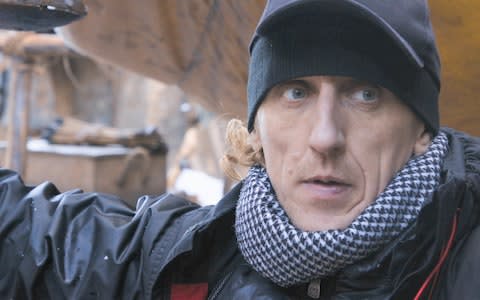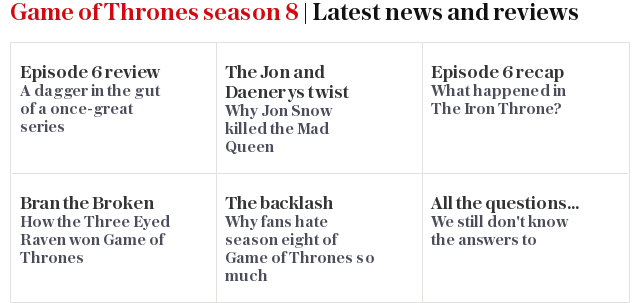Game of Thrones: The Last Watch, review: interesting tidbits, but this by-the-numbers documentary avoided the big questions

It’s just a week since the finale of Game of Thrones but already the episode has become calcified in the collective memory as one of the most divisive ever conclusions to a major television series.
So it was odd sitting through a behind-the-scenes documentary on Sky Atlantic that tackled every question about the making of the final season except the one that really mattered: why was the end of Thrones so controversial?
The simple answer is that it was because of the unfortunate choices made by showrunners David Benioff and DB Weiss. Since running out of George RR Martin books to adapt, they trampled over the subtleties and subtexts of the original novels and pivoted towards Hollywood spectacle.
No doubt they had their reasons and it would have been interesting to step inside their creative process. To hear them, for instance, explain their decision to have Jon Snow kill Daenerys Targaryen and to crown “Bran the Broken” king of Westeros.
But Benioff and Weiss were spectral figures in The Last Watch, popping up in just a handful of scenes and never deigning to be interviewed. Instead, Jeanie Finlay’s two-hour “making of” took it for granted that we all adored the denouement and were eager to dive into the nitty-gritty of how it was put together.

Alas, this reluctance to look to the big picture – and specifically to help us understand why Game of Thrones season eight felt so rushed and overblown – resulted in a diverting but far from essential pulling back of the curtain.
The most telling scenes featured the stars, as might be expected. Conleth Hill’s expression as he discovered at an early table read that his character, Master of Whispers Varys, was to be perfunctorily toasted by Daenerys’s dragon was a masterclass in barely suppressed frustration.
Hill would subsequently express dissatisfaction at how it had all panned out for the previously Machiavellian Varys. In the temple of luvviedom that was the first script read, he didn’t even try to hide his disappointment, which felt telling in itself. Well, what were they going to do – fire him?
It was also revealing to see Emilia Clarke and Kit Harington process the end of their ten-year journey with Daenerys Targaryen and Jon Snow. Nattering to the lady who affixed her blonde wig each morning, Clarke admitted to feeling as if she could finally exhale after a decade.
Harington was, for his part, left damp-cheeked and wobbly of lip upon discovering, at that same fateful table read, that Jon would kill Daenerys. Later we saw him running a gauntlet of phone-wielding fans in Spain before breaking down on his final day of filming in Belfast.

Actors are forever banging on about “life-changing” parts. Yet, streaked in fake blood and smudged in tears, Harington meant every word. Just was fascinating was the contrast between his unease in the spotlight and the baffled delight of stunt-coordinator-turned-actor Vladimir Furdik – aka the Night King.
In Seville, Furdik was thrilled to pose for selfies and pull scary faces with Thrones devotees. He understood his celebrity would vanish the moment Game of Thrones went off the air and was determined to make the most of it.
But Finlay’s access to the big names seemed limited – and an invisible cordon appeared to have been placed around Benioff and Weiss.
So we spent time with the lady who manned the coffee kiosk at Game of Thrones’ Belfast headquarters and with a gung-ho extra who’d originally signed on to the series the day after his house burned down. While their enthusiasm spoke to how much the HBO blockbuster meant to the city, their musings to camera were rarely more than vaguely interesting.
One or two moments made you sit up, it is true. A smudged extra popping along to buy a coffee and Kit Kat during the 55-night Battle of Winterfell shoot turned out to be pop star Sophie Ellis-Bextor.

And you shared in Stark soldier Andrew McClay’s giddiness as he exchanged words with Harington ahead of the actor’s final scene. (Harington was obligingly matey but clearly wouldn’t be joining the extras for pints afterwards.) Perhaps the funniest moment came when the crew, after months of ultra-secrecy, woke one morning to find a Ferris wheel had been constructed overlooking the Belfast set as part of Radio 1’s Big Weekend.
Where The Last Watch fell down was in its failure to address the huge expectations placed on Benioff and Weiss, and the over-arching challenges Games of Thrones faced as it tried to steer towards a neat conclusion.
Was there any anxiety over how the big plot twists would go down? Were the cast nervous about the tying up of their characters’ arcs? These questions were never acknowledged – let alone satisfactorily answered.
Instead, the focus was on the banalities of life on set. Game of Thrones’ final months were a grind of early rises and grim cuppas gulped down in the 6am gloom, and Finlay conveyed that glamour-free reality perfectly.
But for fans hoping for something more – such as an insight into why the final season was so problematic – this by-the-numbers hagiography will have felt like a missed opportunity.

 Yahoo News
Yahoo News 
